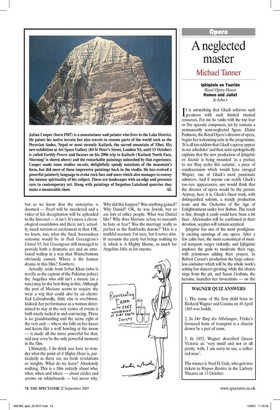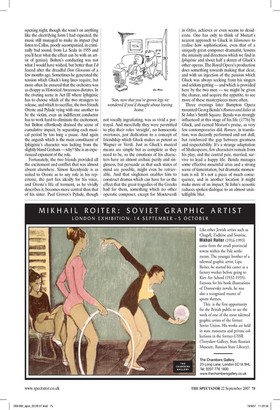A neglected master
Michael Tanner lphigdnie en Tauride Royal Opera House Romeo und Juliet St John's It is astonishing that Gluck achieves such greatness with such limited musical resources. For me he ranks with the top four or five operatic composers, yet he remains a permanently semi-neglected figure. Elaine Padmore, the Royal Opera's director of opera, begins her welcoming note in the programme, 'It is all too seldom that Gluck's operas appear in our schedules' and then semi-apologetically explains that the new production of Iphigenie en Tautide is being mounted 'as a preface to our Ring cycles this autumn', a piece of condescension which would have enraged Wagner, one of Gluck's most passionate admirers. And if anyone can rectify Gluck's too-rare appearances, one would think that the director of opera would be the person. Anyway, here it is, Gluck's finest work, with distinguished soloists, a trendy production team and the Orchestra of the Age of Enlightenment under Ivor Bolton. The result is fine, though it easily could have been a lot finer. Aficionados will be confirmed in their devotion, sceptics will remain sceptical.
Iphigenie has one of the most prodigiously exciting openings of any opera. After a few calm bars, the most economical of musical tempests surges violently, and Iphigenie implores the gods to moderate their rage, with priestesses adding their prayers. In Robert Carsen's production the large colourless container which will be the whole work's setting has dancers gyrating, while the chorus sings from the pit, and Susan Graham, the heroine, launches her invocations — on the opening night, though she wasn't on anything like the electrifying form I had expected, the music still managed to make its impact (but listen to Callas, poorly accompanied, in criminally bad sound, from La Scala in 1955 and you'll hear what the effect can be with an artist of genius). Bolton's conducting was not what I would have wished, but better than I'd feared after the dreadful Don Giovanni of a few months ago. Sometimes he generated the tension which Gluck's long lines require, but more often he ensured that the orchestra was as choppy as Historical Awareness dictates. In the riveting scene in Act III where Iphigenie has to choose which of the two strangers to release, and which to sacrifice, the two friends Oreste and Pylade vying with one another to be the victim, even an indifferent conductor has to work hard to eliminate the excitement, but Bolton effortlessly drained the scene of cumulative impact, by separating each musical period by too long a pause. And again the anguish which is the main constituent of Iphigenie's character was lacking from the slightly bland Graham —why? She is an experienced exponent of the role.
Fortunately, the two friends provided all the excitement and conflict that was almost absent elsewhere. Simon Keenlyside is as suited to Oreste as to any role in his repertoire, the part lies ideally for his voice, and Oreste's life of torment, as he vividly describes it, becomes more central than that of his sister. Paul Groves's Pylade, though not vocally ingratiating, was as vivid a portrayal. And mercifully they were permitted to play their roles 'straight', no homoerotic overtones, just dedication to a concept of friendship which Gluck makes as potent as Wagner or Verdi. Just as Gluck's musical means are simple but as complete as they need to be, so the emotions of his characters have an almost archaic purity and singleness, but persuade us that such states of mind are possible, might even be retrievable. And that singleness enables him to construct dramas which can have for us the effect that the great tragedies of the Greeks had for them, something which no other operatic composer, except for Monteverdi in Orfeo, achieves or even seems to desiderate. One has only to think of Mozart's nearest approach to Gluck in Idomeneo to realise how sophistication, even that of a uniquely great composer-dramatist, lessens the intensity and directness which we find in Iphigenie and about half a dozen of Gluck's other operas. The Royal Opera's production does something towards making that clear, and with an injection of the passion which Gluck was always seeking from his singers and seldom getting — and which is provided here by the two men — we might be given the chance, and acquire the appetite, to see more of these masterpieces more often.
Three evenings later Bampton Opera mounted Georg Benda's Romeo und Juliet at St John's Smith Square. Benda was strongly influenced at this stage of his life (1776) by Gluck, and earned Mozart's praise, as very few contemporaries did. Romeo, in translation, was decently performed and not dull, but reinforced the gap between greatness and respectability. It's a strange adaptation of Shakespeare, few characters remain from his play, and the central pair, married, survive to lead a happy life. Benda manages some effective mournful arias and a strong scene of lamentation, but dramatic momentum is nil. It's not a piece of much consequence, and in another location it might make more of an impact; St John's acoustic reduces spoken dialogue to an almost unintelligible blur.


































































 Previous page
Previous page